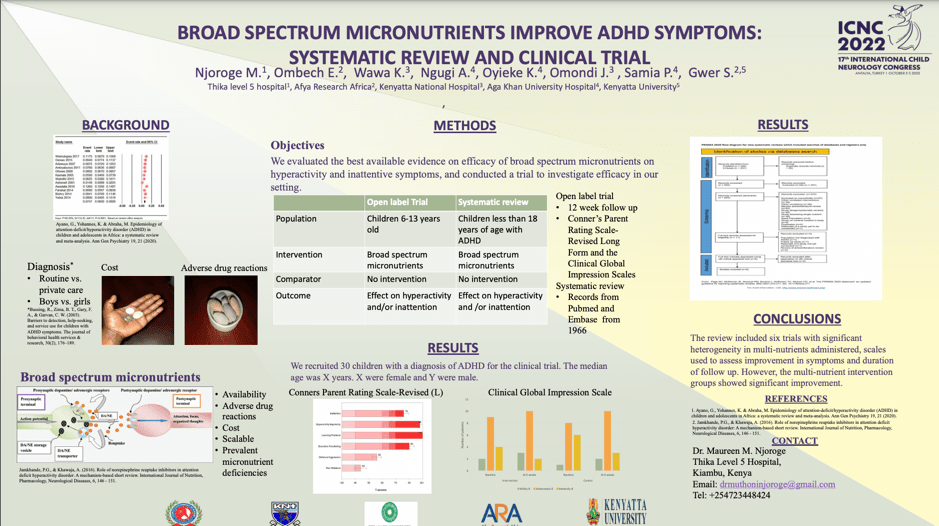BROAD SPECTRUM MICRONUTRIENT SUPPLEMENTATION IN THE MANAGEMENT OF ADHD: A CLINICAL TRIAL AND SYSTEMATIC REVIEW
Maureen Njoroge, Samson Gwer
Objectives Pharmacotherapy in ADHD is associated with at least one adverse event in half of patients. Broad spectrum micronutrients may improve ADHD symptoms. We evaluated the best available evidence on efficacy of broad spectrum micronutrients on hyperactivity and inattentive symptoms, and conducted a trial to investigate efficacy of broad spectrum micronutrients. Method We conducted a systematic review of published and unpublished studies on the use of broad spectrum micronutrients in childhood ADHD. We also undertook an open label trial with 2 arms: broad spectrum micronutrients and no micronutrient therapy, on children aged between 6 and 13 years with ADHD. We assessed outcomes using Conner’s Parent Rating Scale-Revised Long Form and the Clinical Global Impression Scales over 12 weeks of follow up. Results We identified seven interventional studies that investigated use of broad spectrum micronutrients in children. Four studies were randomized controlled trials and three were quasi-experimental trials. Three studies suggested improvement in hyperactivity symptoms in up to 84% of patients, two studies suggested decrease in inattentiveness rated as clinically significant, and one study reported similar efficacy of methylphenidate and broad spectrum micronutrients. One study reported no difference in outcome. For the trial, we recruited 15 children in each arm. Follow up is ongoing and outcomes will be assessed over the next 3-6 months. Conclusion Micronutrients present a safe and scalable treatment option and show promising evidence for treatment of ADHD. In low income settings, there is opportunity to solve for prevalent micronutrient deficiencies that could alter symptomatology.
Keywords: Attention Deficit Hyperactivity Disorder
Maureen Njoroge
Aga Khan University Hospital, Nairobi
Kenya
Samson Gwer
Kenyatta University
Kenya
Objectives Pharmacotherapy in ADHD is associated with at least one adverse event in half of patients. Broad spectrum micronutrients may improve ADHD symptoms. We evaluated the best available evidence on efficacy of broad spectrum micronutrients on hyperactivity and inattentive symptoms, and conducted a trial to investigate efficacy of broad spectrum micronutrients. Method We conducted a systematic review of published and unpublished studies on the use of broad spectrum micronutrients in childhood ADHD. We also undertook an open label trial with 2 arms: broad spectrum micronutrients and no micronutrient therapy, on children aged between 6 and 13 years with ADHD. We assessed outcomes using Conner’s Parent Rating Scale-Revised Long Form and the Clinical Global Impression Scales over 12 weeks of follow up. Results We identified seven interventional studies that investigated use of broad spectrum micronutrients in children. Four studies were randomized controlled trials and three were quasi-experimental trials. Three studies suggested improvement in hyperactivity symptoms in up to 84% of patients, two studies suggested decrease in inattentiveness rated as clinically significant, and one study reported similar efficacy of methylphenidate and broad spectrum micronutrients. One study reported no difference in outcome. For the trial, we recruited 15 children in each arm. Follow up is ongoing and outcomes will be assessed over the next 3-6 months. Conclusion Micronutrients present a safe and scalable treatment option and show promising evidence for treatment of ADHD. In low income settings, there is opportunity to solve for prevalent micronutrient deficiencies that could alter symptomatology.
Keywords: Attention Deficit Hyperactivity Disorder
Maureen Njoroge
Aga Khan University Hospital, Nairobi
Kenya
Samson Gwer
Kenyatta University
Kenya

Maureen Njoroge
Aga Khan University Hospital,
Nairobi Kenya
Aga Khan University Hospital,
Nairobi Kenya